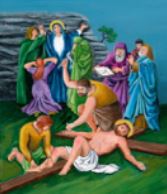
 The Eleventh Station: Jesus is Nailed to the Cross
The Eleventh Station: Jesus is Nailed to the Cross
Recently my husband Richard and I saw the movie, Risen, in which Jesus’ death and resurrection are seen through the eyes of the Roman tribune Clavius. While the character Clavius is a dramatic invention, what he experiences is not. In Risen, Clavius was charged with carrying out the sentence of Jesus’ crucifixion. As Jesus hangs on the cross as a common criminal, there are some who see something different about him. An awestruck Roman soldier quietly tells Clavius, “This man was innocent.” Pontius Pilate later says, “It’s as if he wanted to be sacrificed.”
But Jesus did not simply die to make a statement, there is – there has to be – more to his sacrifice. I have read that, in being crucified, Jesus entered fully into our human experience of pain, that we can then take comfort in knowing that he has felt suffering. While there is some merit to that view, I do not think it is complete. One of my spiritual directors put it this way:
“Jesus died to lead us through our suffering to a better, stronger place. While the suffering might continue, what changes is how we view and process what we experience. God’s presence in our suffering is more than mere comfort, it is transformative. We move from victims to victors as our faith converts our hurt to healing, our injury to strength, and our experience into gift. It moves from pain to gift when we then stand with another going through what we’ve been through and help them through their ordeal, converting hurt to healing, etc.”
In Risen, the disciple Bartholomew exclaims, “Our only weapon is love!” As we follow Jesus’ example of love, the world is transformed.
Let us pray:
Lord Jesus Christ, you stretched out your arms of love on the hard wood of the cross that everyone might come within the reach of your saving embrace: So clothe us in your Spirit that we, reaching forth our hands in love, may bring those who do not know you to the knowledge and love of you; for the honor of your Name. Amen.
Collect from Morning Prayer, Rite II, The Book of Common Prayer (1979)
–Erlinda Blevins



